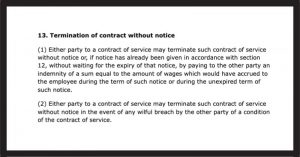Underpaid contract workers found in government buildings

- 125Shares
- Facebook99
- Twitter7
- LinkedIn6
- Email6
- WhatsApp7
Before the glorious year of 2013, employers back then could choose to pay their workers as low as RM300 because there was no Minimum Wage Orders.
The only way workers could fight for their rights to earn a liveable wage was through the Wages Council Act 1947, which was a hassle to many overworked and underpaid workers.
“These Councils would discuss and submit Wage Regulations Proposals which the government may choose to enact in a Wage Regulation Order. Wage rates of unionised sectors of the workforce are then determined through a collective agreement and set through decentralised collective bargaining.” – As quoted from Vulcan Post.
It took us almost 10 years to have the minimum wage set at RM1,500, yet it is still disproportionate considering the high cost of living. And despite having minimum wage…
Some government contract workers tried to ask for minimum wages but got fired
Despite the implementation of the new minimum wage this year, contract workers at government schools and buildings were still being paid at the old minimum wage rate, as reported by the Jaringan Pekerja Kontrak Kerajaan (JPKK), an organisation that fights against oppression that occurs to contract workers such as cleaners and security guards.

Parti Sosialis Malaysia (PSM) chairperson of the Dengkil branch, Dr. Darren Ong, had recently visited 20 schools and government buildings in Putrajaya for a spot check with some activists to find out if the contract workers were paid minimum wage.
They found out that many of the contract workers are still paid under the minimum wage.
“… by law they were supposed to get a pay increase in May. But they felt powerless to do anything about it, and feared retaliation from their employers.” – Dr. Darren Ong in the press release sent to Cilisos.
Most of them are aware that their basic rights are abused, but fear of losing their jobs kept them silence.
Complaints were made, but Jabatan Tenaga Kerja (JTK) didn’t do anything about it
We spoke to Sivaranjani, an activist who has been actively working with JPKK, to deal with JTK (Labor Department).
Sivaranjani said that JPKK would submit the complaints to JTK and the only response they received was that a letter was sent to employers to implement minimum wage.
The workers were then asked to make a direct claim at the Labor Department. Sivaranjani alleged that this was done on purpose as JTK knew the contract workers won’t do it as they are scared of the possibility of retaliation.
“Recently 4 workers who bravely went and file claim were terminated by the company, so the fear is real among the workers. JTK do not protect workers who are coming forward to file cases.” – Sivaranjani, to Cilisos.
Most of these contract workers are from the lower income group, with little to no job opportunities available for them, which forces them to stay in an exploitative working condition.

To make matters worse, contract workers are denied most protections provided through Malaysian Labor Law.
Are workers around Malaysia being paid fair wages?

This incident only says one thing, and it is that there are loopholes which employers could use to get away from compensating their workers accordingly.
Due to this, some have called for an effort by the government to monitor the enforcement of the new Minimum Wage Orders.
“All these complaints need to be investigated and addressed immediately to avoid confusion and compounding the problems on workers, who are dealing with financial stress and the increase cost of living.” – Muzaffar Shah Mallow, USIM researcher, as quoted from the Sun Daily.
It’s important to emphasise the issue here because if an agency hired by the federal government can treat their contract workers poorly, what happens to other employees under private companies?
- 125Shares
- Facebook99
- Twitter7
- LinkedIn6
- Email6
- WhatsApp7



